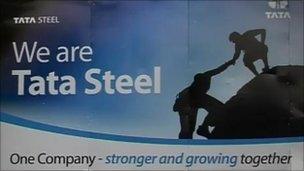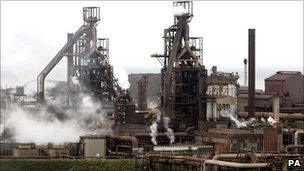Corus name removal is end of era for steel industry
- Published

The Tata logo will be far more visible now the new signs have been adopted
It may be cosmetic, but the removal of the Corus name and logo from steel plants across the UK marks the end of an era.
From now, the name of the Indian owners Tata will be on display.
British Steel became Corus in 1999 when it merged with the Dutch steel business Hoogovens BV.
The Corus era was dominated by decline. There were the decisions to close the Ebbw Vale works and the end of steel production at Llanwern.
At one stage, the Corus share price fell to 4p.
After such a turbulent time, there was concern when the Indian firm Tata bought Corus in 2007. Since then it has been a rollercoaster journey.
First came the credit crunch and the recession which led to a 1,000 job losses in Wales alone. But since then there have been grounds for optimism.
An investment of nearly £200m in a new blast furnace at Port Talbot was announced in the summer. There was also the investment of £60m in a new plant to recycle emissions.
So what does the future hold under Tata?
The most talked about possibility is for a deep mine to be built at the Port Talbot works.
A £6m feasibility study is in the process of being carried out.
If it goes ahead, the Aberavon MP Hywel Francis has described it as a defining moment which would be comparable to the construction of the steelworks in the first place.
He believes it's a matter of when, not if, the decision is made.
The Margam super pit has been spoken about since the early seventies but no-one has ever tapped into its vast reserves.
If it goes ahead, Tata would be looking to mine 1m tonnes of coal a year. That is about half the amount that Port Talbot requires and in terms of tonnage would make it the biggest pit ever to have been built in south Wales.

Could a deep mine be built under the Port Talbot plant which dominates the town's skyline?
The investment could be as much as £500m and the mine could employ more than 300 people.
The scale is huge and would pose some serious challenges, including finding the necessary manpower.
Tyrone O'Sullivan, chairman of Tower Colliery in the Cynon Valley, also looked into mining the Margam seam in the past.
He acknowledges that some foreign labour would have to be used initially but he's called for a training centre to be set up around one of the existing deep mines in Wales to prepare a new generation of workers.
Even if it is geologically possible to run a drift mine from the steelworks, underneath the M4 and then into the seam, it will all come down to cost.
The big question is whether it is cheaper in the long run than shipping the coal in from places like Australia and Africa.
The advantages for Tata are obvious.
It would become the only steel plant in Europe with a guaranteed supply of coal at a fixed price on its doorstep but on the downside the initial costs are so large it will require complete confidence from the Tata management.
Meanwhile, time will tell whether the name change will be used by local people on Deeside, Flintshire.
They still refer to the Shotton steelworks site by the name of its original owner, John Summers, who founded the factory in the late 1800s even though it became British Steel in the 60s, and Corus in the 90s.
- Published16 August 2010
- Published17 August 2010